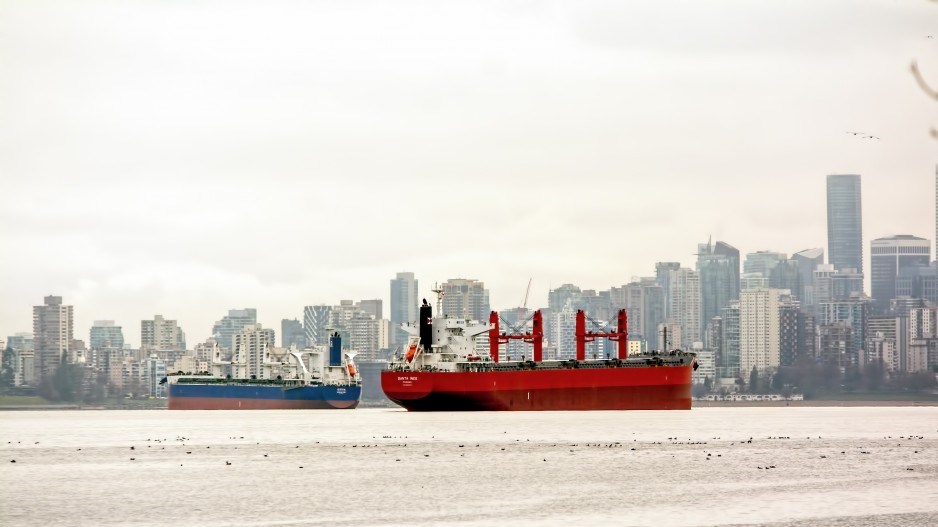Amid ongoing blockades on Canadian rail lines and Port of Vancouver property, Andrew Wynn-Williams can squeeze at least one economic positive emerging from the tense national protests.
“Because we’re so close to the port, a lot of our manufacturers, particularly in the Lower Mainland, don’t use rail. They use trucks,” said the Canadian Manufacturers & Exporters’ (CME) vice-president for B.C.
“However, the flip side is because we’re so close to the port, the economic impact of the port disruption is huge.”
After some back-of-the-napkin math, Wynn-Williams estimated declines in B.C. manufacturing shipments abroad come at a cost of about $30 million a day.
That number is pulled from CME’s national estimates of $425 million in daily losses, with B.C. accounting for 8% based on the province’s $52 billion in manufacturing shipments abroad in 2019.
“Any time there’s that kind of uncertainty, it’s not going to be good. People will hang on to their investment dollars,” Wynn-Williams said.
“The longer it goes on, the harder it’s going to be to recover.”
His organization is encouraging government to consider investment programs to help industry following the disruptions that kicked off in opposition to the Coast GasLink pipeline in northern B.C.
The protests are just the latest punches industry has been absorbing in earnest since last fall, according to Robert Lewis--Manning, president of the Vancouver-based Chamber of Shipping.
More than 3,000 Canadian National Railway (TSX:CNR) workers staged a weeklong strike in November, while worse-than-expected winter weather in B.C. made loading agricultural products quite difficult.
“It is a huge confluence,” Lewis-Manning said.
At the end of February, he estimated about 60 to 70 ships were in anchor off the B.C. coast from north to south.
“All those ships are just jamming the system up, and it’s going to be slow to load them,” Lewis-Manning said, adding the amount of time to address the backlog has recently moved from a matter of weeks to a matter of months.
“It’s the reliability that really matters, especially for containerized cargo.”
But because containerized traffic can shift easily to other ports in North America, he said, there’s always a risk that ships and cargo could be diverted to ports in the U.S. in the long term.
“The congestion that’s created from this obviously stretches the supply chain, but more importantly what it creates is unreliability on the international stage from a reputational perspective,” said Mike Leonard, president and CEO of the BC Maritime Employers Association (BCMEA).
For the week of February 2-8, the BCMEA found worker shifts dropped 23% compared with a year earlier at the Port of Vancouver’s south shore (Burrard Inlet) and 12% at Deltaport as blockades targeted those locations.
For the week of February 9-15, worker shifts dropped 20% year-over-year at the Prince Rupert port as protesters blocked the single rail line leading to and from that location.
“This is having a real human impact,” Leonard said.
“We have 7,000 highly skilled men and women who want to go to work every day, want to perform their jobs safely and want to provide for their families, and they’re basically caught up in this.”
Meanwhile, the ongoing jam-ups have been mitigated somewhat by the outbreak of the novel coronavirus – or COVID-19 – in China.
Lewis-Manning said the outbreak is slowing China’s manufacturing sector, which has in turn resulted in a drop in shipments to Vancouver.
While that may ease congestion at the ports, he said the slowdown is harming the B.C. economy.
Ken Peacock, chief economist at the Business Council of BC, said it would be months before the full toll of the blockades on top of the COVID-19 outbreak can be properly measured.
“More disruptions, more inability to get products to markets, more inability for producers to ship their products out overseas – that’s just disruptive, and it does become costly,” he said.
For now, long-term reputational harm is the No. 1 concern for Bob Wilds, executive director of BC Marine Terminal Operators Association.
“Exporters as well as the purchasers of the commodity always look for a reliable chain. And if you continually are impeding and blocking and making it difficult, they look for other sources of goods,” he said.
“That could be at the expense of Canadian shippers, whether it’s our grain products, sulphur, coal, potash or any of the commodities we ship out of here to international markets.”




